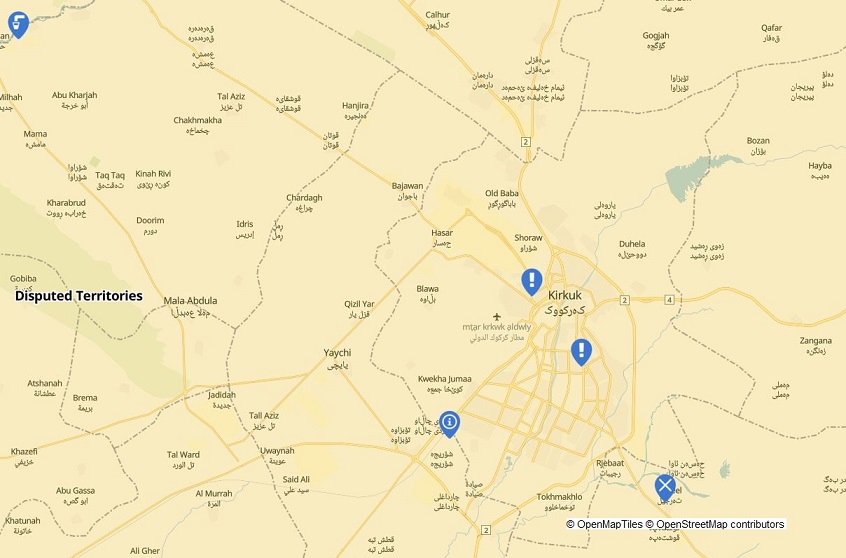1.1K
A weekly brief of events and news occurred in the disputed territories.
Kirkuk
- On January 2, several Arab settlers from the Hawija area raided the Kurdish-owned farmlands in the Tarjil village of the Laylan subdistrict, attempting to occupy it. Chalak Ahmad, a resident of Tarjil village, told the media that he was planting wheat for the season when four vehicles carrying armed men came to the fields and told the tractor drivers to leave the fields. He also revealed that after arguments, the settlers returned but threatened not to give up. The former Iraqi regime stripped the Tarjil village from the Kurds in 1987 and granted it to Arab settlers through “agriculture contracts.” However, in 2012, the Article 140 Committee canceled the contracts on the lands and compensated the settlers financially.
- Anti-government protests kicked in again soon after the new year’s holiday. On January 2, the North Oil Company (NOC) trainees continued their demonstration demanding employment in front of the company. Security forces fired tear gas and arrested 12 demonstrators, who have not been released yet. About 458 demonstrators, who graduated from colleges and oil studies, were trained six months earlier last year to be employed by the NOC. However, the company has created obstacles, preventing their employment. The protests started three months ago.
- According to a survey conducted by the Iraqi Mawazin Agency, Rakan al Jabouri, the acting governor of Kirkuk, received 2% of the votes, ranking him ninth among fifteen governors in 2022. Al Jabouri received only 143 votes, 2% approval. Since October 16, 2017, the Iraqi government imposed al Jabouri on the province, and the primary services have deteriorated dramatically.
- According to the newly released statistical report by the State Organization for Marketing of Oil (SOMO), in December, 2,223,338 barrels of oil were exported from Kirkuk oil fields through the Cihan pipeline, grossing $167,306,184. The average price of oil was $75.25 per barrel. The December sales have decreased by 139,682 barrels compared to November, which was 54,873 barrels less than October. In December, exports of Kirkuk oil to Jordan reached 322,970 barrels, earning $21,031,806 at an average price of $65.12 per barrel. In contrast to the decline in exports through the Cihan pipeline, exports through Jordan increased by 22,740 barrels in December compared to November.
- Sabah Habib, a Kurdish lawmaker of Kirkuk, claimed that the Iraqi Council of Ministers had approved the transfer of the employment of Kurdish teachers in the disputed territories to the Iraqi Ministry of Education. According to the lawmaker, prime minister Mohammed Shia Sudani approved the plans for Kurdish school teachers to be paid for by Baghdad. The transfer of services and salaries of Kurdish teachers in the disputed territories from the Kurdistan Regional Government (KRG) to the federal government has been teachers’ primary demand.
Khanaqin
- In a press conference on January 2, Rawa Samir, director of the Khanaqin office of the Kurdish areas outside the Kurdistan Regional Government (KRG), said that the Kurdish population had decreased significantly and dangerously in the Jalawla district from 45% to 10%. He attributed the reason to the policy of Arabization, which has been restored in Khanaqin and Jalawla. “Thousands of Arabs are settled in the district, their records are being transferred, and they occupied houses, lands, and property of the displaced Kurds,” said Samir.
Makhmour
- On January 1, Iraqi Defense Minister Sabbath Mohammed al Abbasi arrived in the Makhmur district and met with military commanders at the headquarters of the 14th Infantry Division of the Iraqi army. According to the Iraqi News Agency, the sudden visit of the Iraqi Defense Minister to Makhmur, due to activities of ISIS (Da’esh), especially in the past three months. Al Abbasi has ordered the “provision of the necessary thermal cameras” for the Iraqi army positions in Makhmur and its surroundings within a week. The area has become the Da’esh hub since October 16, 2017.
Shingal (Sinjar)
- On December 26, after decades, the Council of Ministers decided to allow the registration of Yazidi-owned lands and houses. On January 3, the Council of Ministers issued instructions on registering lands and homes free of charge for Shingal residents. The decision will solve about 60,000 houses and residential land in 13 districts and communities. For nearly a century, the Yazidis could not register their homes and properties with the government. Ivan Faiq Jabro, Minister of Migration and Displaced, said the Council of Ministers’ decision comes within the ministerial program’s framework. She also revealed that in 2022, the United Nations (UN) submitted a detailed report to the government describing its neglect as “a serious human rights violation.”

